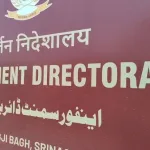Dr. AIJAZ HASSAN GANIE & DR. SHOWKAT AHMAD GANIE
In Kashmir Himalaya different species of the Potato family are either cultivated or growing in wild. So this biodiversity hot spot has various plants that can be exploited for future research for development of new formulations and treatment of dreadful diseases like cancer. Cancer disease is so common now that every one of us know a person suffering from this disease. This disease is one of the most common causes of death globally. In 2020, approximately 19 million new cases of cancer and 10 million deaths due to cancer were registered. The number of cancer cases is expected to increase to more than 28 million by 2040. The treatment to this dreadful disease is improving all the time but one problem of these treatments are still there- damage healthy cells or have severe side-effects which are not good for the patients. In search for new formulations to treat this dangerous disease scientists led by Magdalena Winkiel at Adam Mickiewicz University-London, reported (December, 2022) that the bioactive compounds called glycolalkaloids that are found in many vegetables -are household names, like Potatoes and Tomatoes, have potential to treat cancer.
Throughout the world scientists are searching for the drugs which will be lethal to cancer cells but at the same time safe for healthy cells. It is not easy despite the advances in medicine and powerful development of modern treatment techniques. That is why it might be worth going back to medicinal plants that were used years ago with success in the treatment of various ailments. The studies on ethno medicinal properties of plants have the potential of discovering potential drugs to treat such diseases. The first antimalarial drug was obtained from plants of Jesuit’s bark. Artemisinin, lactone with antimalarial properties, was isolated from Annual absinthe. The source of morphine was Opium poppy.
Winkiel and her colleagues focused on five glycoalkoloids which include: solanine, chaconine, solasonine, solamargine and tomatine – which are found in crude extracts of the plants of the Potato family also known as Nightshades.This family contains many popular food plants – and many that are toxic, frequently because of the alkaloids they produce as a defense against animals that eat plants. But the correct dose can turn a poison into a medicine: once scientists have found a safe therapeutic dose for alkaloids, they can be powerful clinical tools.
The research group led by Winkiel highlight glycoalkaloids derived from potatoes, like solanine and chaconine – although the levels of these present in potatoes depend on the cultivar of potato and the light and temperature conditions the potatoes are exposed to. Solanine stops some potentially carcinogenic chemicals from transforming into carcinogens in the body and inhibits metastasis. Studies on a particular type of leukemia cells also showed that at therapeutic doses, solanine kills them. Chaconine has anti-inflammatory properties, with the potential to treat sepsis. The constituent of Brinjal plant called solamargine stops liver cancer cells from reproducing. Solamargine is one of several glycoalkaloids that could be crucial as a complementary treatment, because it targets cancer stem cells which are thought to play a significant role in cancer drug resistance. Solasonine, which is found in several plants from the Potato family, is also thought to attack cancer stem cells by targeting the same pathway. Even tomatoes offer potential for future medicine, with tomatine supporting the body’s regulation of the cell cycle so that it can kill cancer cells. Tomatine is a steroidal glycoalkaloid that occurs in large amounts in the leaves of tomatoes. It is a biologically active substance and, in addition to its anticancer properties, has a wide range of activities, such as insecticidal, fungicidal, antibiotic and anti-inflammatory
In Kashmir Himalaya different species of the Potato family are either cultivated (Potato, Tomato, Brinjal, Red Chili) or growing in wild (Indian belladonna, Thorn apple, Black henbane, Black nightshade, Wild eggs plant, Bladder-grass, Red nightshade, Winter cherry, European black nightshade, Black fruit wolfberry, Prickly burr). These plant species of the potato family also contain active principles that are effective in the treatment of dreadful diseases like cancer. Almost every adult Kashmiri must have eaten the fruits of Black nightshade, in Kashmiri we called it ‘Kambai’ and in our childhood days the elder people used to say it is good for liver and treatment of liver diseases. Recent studies have also shown that the fruits of this pant have anti-tumor properties and also a good candidate for treatment of lung cancer.
The Brinjal (Kashmiri= ‘Wangum’) we use as vegetable also have anti-cancerous properties. Likewise the juice of Potato (Kashmiri= ‘Ailivee’) have proved effective in intestinal cancers, the Tomato (Kasmri= ‘Rounthwangun’) we eat as vegetable is one of the candidate to treat various cancers and also aid in combination with some other ingredients to check cancer cell growth. Some of the plants of Potato family are toxic, frequently because of the alkaloids they produce but the correct dose can be used as medicine: once scientists have found a safe therapeutic dose of these constituents, they can be powerful clinical tools. In Kashmir Himalaya some of the local herbal healers also use the plants of Potato family as medicine e.g., Indian belladonna; (Kashmiri= ‘Maitbrand’) Bladder-grass (Vernacular name= Lan Tang’), which are otherwise toxic; the knowledge of these herbal healers may prove useful in discovery of drugs that may prove useful in treatment of diseases like cancer.
Further research will be needed to determine how this in vitro potential can best be turned into practical medicine. There is some reason to believe that high temperature processing improves glycoalkaloid properties, and nanoparticles have recently been found to improve transmission of glycoalkaloids to cancer cells, boosting drug delivery. However, the glycoalkaloids’ mechanisms of action need to be better understood, and all potential safety concerns need to be scrutinized, before patients can benefit from cancer drugs straight out of the vegetable plants.
There is also no concern for overexploitation and conservation as most of these plant species are cultivated and have long history of cultivation in different agro-climatic conditions, thus further research in this field may revolutionize the drug discovery to treat diseases like cancer.
(Dr Aijaz Hassan Ganie is associated with Department of Botany, Kashmir University. DR. Showkat Ahmad Ganie is associated with Department of Clinical Biochemistry, Kashmir University)





